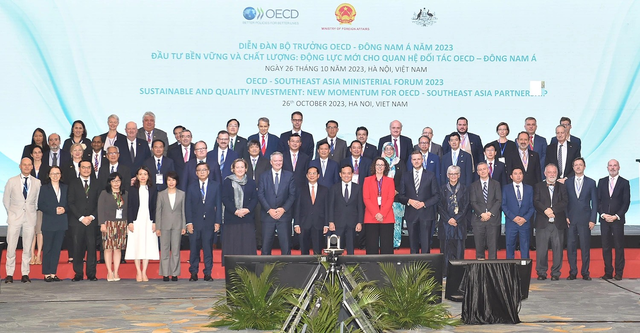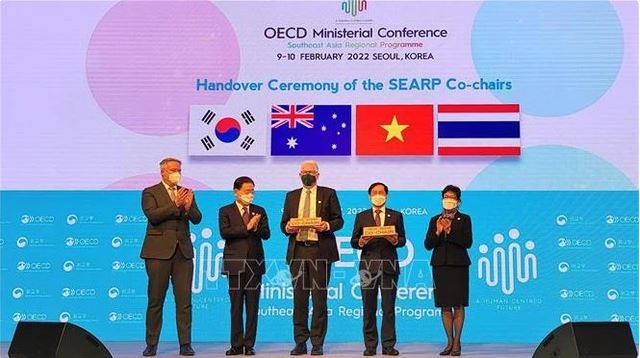Making news
Vietnam helps position SEARP as regional cooperation pillar with substantive impacts: Deputy FM
Vietnam, as a co-chair of the OECD Southeast Asia Regional Programme (SEARP) for 2022-2025, has contributed to turning the initiative into a truly regional cooperation pillar with substantive impacts and long-term vision, according to Deputy Minister of Foreign Affairs Nguyen Minh Hang.
Speaking to the press on the occasion of Vietnam’s completion of its co-chairmanship, Hang said that SEARP is one of the Organisation for Economic Co-operation and Development (OECD)’s five regional programmes. It was launched in 2014 at the initiative of Japan to support economic reform across the Southeast Asian region through sharing development experience and promoting sustainable and inclusive economic growth via 13 collaboration areas.
Vietnam together with Australia led the programme in an unprecedented challenging period marked by post-pandemic recovery, disrupted global supply chains, and increasingly severe climate-related disasters. Besides, the sweeping impacts of the Fourth Industrial Revolution, and breakthroughs in semiconductor and AI forced developing nations to renew growth model and invest in science-technology as new breakthrough drivers.
In response to these dynamics, Hang said Vietnam and Australia worked with SEARP members to identify three strategic priorities. They identified that the focus should be channeled to supporting Southeast Asian countries to overcome short-term economic shocks by promoting appropriate fiscal and monetary policies, supporting micro, small and medium enterprises, and strengthening supply chain resilience.
Additionally, the initiative helped regional countries with carrying out structural reform to improve productivity, better business and investment climate, bolster innovation, and develop high-quality human resources towards sustainable and inclusive growth. Besides, it strengthened cooperation between Southeast Asian countries and OECD through sharing experience and applying OECD standards and best practices to help the countries align more closely with international standards on governance, transparency, and sustainable development, according to Hang.
Key cooperation areas included enhancing economic self-resilience against shocks, promoting reforms to support private sector recovery, expanding trade and investment, and advancing green and digital transformation.
Based on the agreed priorities, stakeholders implemented multiple activities, with the most notable being a Memorandum of Understanding between ASEAN and OECD, organisation of regional ministerial-level forums on practical topics, and conducting extensive research, assessments, and economic reports while providing timely and appropriate recommendations, and delivering capacity-building programmes for ASEAN nations.
SEARP, Hang noted, contributed to the regional economic recovery, elaborating the Southeast Asian region has become a bright spot for economic growth amidst global instability. Through specific activities like supporting small and medium enterprises' integration into global value chains, building digital infrastructure and developing digital economy, reforming tax systems and strengthening foreign investment attraction and management, and promoting green growth and circular economy, SEARP has served as a bridge promoting reform processes in regional countries towards alignment with world-class standards while encouraging deeper, more substantial cooperation with OECD.
Currently, Indonesia and Thailand have become the first Southeast Asian nations to initiate OECD membership negotiation roadmaps, she added.
The diplomat highlighted that with such robust results which have been acknowledged by OECD members and Southeast Asian countries, Vietnam has affirmed its role, positive contributions, responsibility as well as management and leadership capabilities at multilateral mechanisms.

At the SEARP co-chairmanship handover ceremony, the OECD Secretary-General underscored that under Vietnam and Australia's leadership, SEARP elevated the relationship between OECD and Southeast Asia to a new high.
The Deputy FM said Vietnam’s holding of an important position within a high-standard international organisation like the OECD demonstrates a step to realise the foreign policy outlined at the 13th National Party Congress and in Directive 25-CT/TW on promoting and elevating multilateral diplomacy by 2030, issued by the Party Central Committee’s Secretariat.
Speaking on Vietnam’s experience as SEARP Co-Chair, she highlighted several key lessons, including the importance of proactively engaging in the shaping of multilateral institutions and the international political-economic order while stepping up the perfection of domestic policies, laws, and mechanisms to improve the capacity of implementing international commitments and agreements. These steps, she said, will help enhance Vietnam’s global standing and capitalise on every resource for development.
The official also highlighted the need to stay steadfast in the Party and State's consistent policy of proactively integrating into the world, elevating multilateral diplomacy, and deepening ties with reputable and influential international organisations, both regionally and globally, the official noted.
Besides, Vietnam’s impressive socio-economic achievements, including its internationally recognised resilience, fast recovery, and development after the pandemic, helped the country win support and active participation from all OECD members as well as Southeast Asian nations for its initiatives within SEARP.
Another lesson, she said, is maximising international resources. The invaluable and timely support from the OECD and member countries, especially Co-Chair Australia, in terms of both financial and technical resources, has enabled Vietnam to propose and advance ambitious cooperation programmes and effectively fulfil its role as Co-Chair.
As Vietnam aims to become an upper-middle-income developing nation by 2030 and a developed country by 2045, Hang called for continued OECD support, particularly in economic reform, competitiveness improvement, investment attraction, and national governance aligned with global standards.
In the near term, Vietnam will keep coordinating with the OECD to fruitfully carry out the bilateral memorandum of understanding, work towards establishing an OECD country programme for Vietnam, expand the country's participation in OECD specialised committees, and boost information sharing and economic reporting to help with the making of long-term development policies. The country is also laying groundwork for potential OECD membership, she said.
Looking ahead, Vietnam will work closely with Canada and the Philippines, SEARP co-chairs for 2025–2028, to foster a sustainable Southeast Asia further integrating into the international community, the Deputy FM continued, reaffirming Vietnam’s commitment to helping strengthen SEARP’s role as a vital bridge between the OECD and Southeast Asia, and also a contributor to a rules-based economic order and a greener, more sustainable, and more prosperous future./.



















